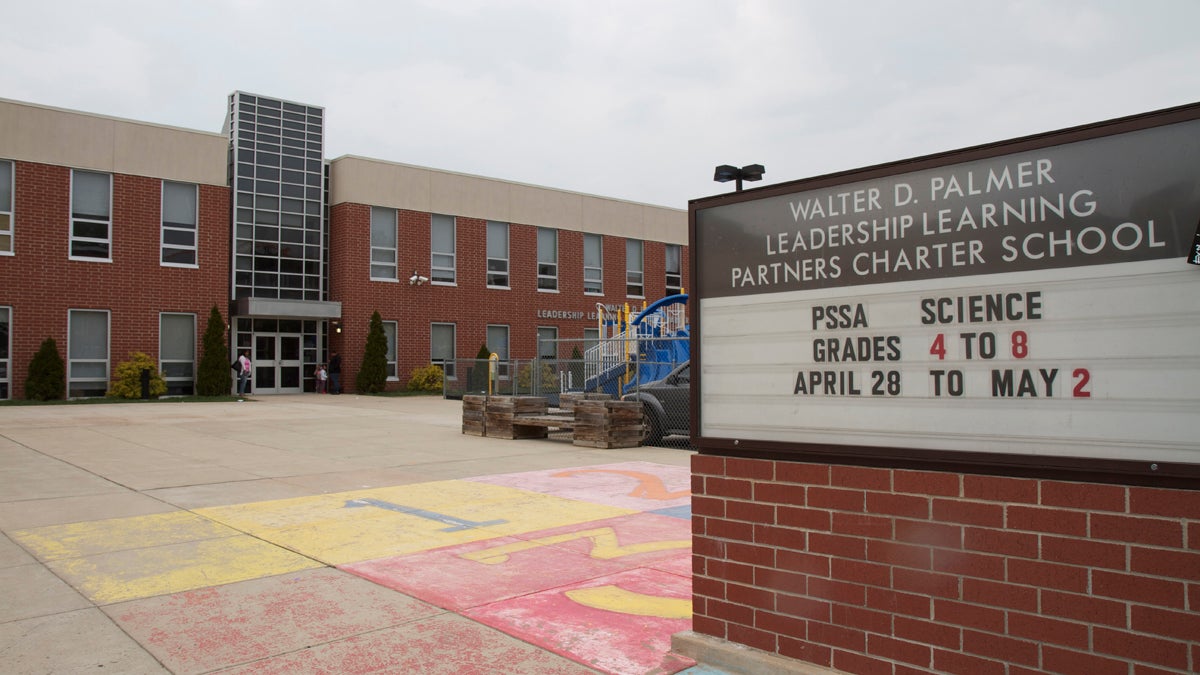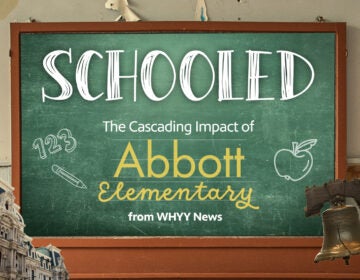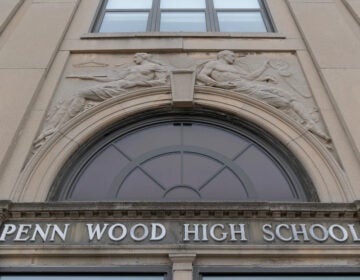Philly School District wants to close down Walter Palmer charter school as of July

Walter D. Palmer Leadership Learning Partners Charter School (Kevin McCorry/for NewsWorks)
The charter school office of the School District of Philadelphia is recommending that Walter D. Palmer Leadership Learning Partners Charter School be shut down after the end of this school year.
A six-page District memo cites problems including declining test scores, a $3 million general fund deficit, and failure of its associated foundation to maintain its nonprofit status.
A 1,300-student K-12 school with two campuses, Palmer is one of the oldest and largest charters in the city. It has been in an ongoing battle with the District over the school’s practice of enrolling students over its approved enrollment cap of 675.
The recommendation will be presented to the School Reform Commission at its Thursday meeting.
“This difficult decision was made with substantial evidence that this school is not serving the needs of students and their families,” said Superintendent William Hite in a statement. “We require better student outcomes from a public institution that was granted a charter to educate children. We must use all of our resources towards supporting students in academic success.”
Among the problems cited in the memo:
The school failed to make “adequate yearly progress,” the measure of academic improvement under the No Child Left Behind law, in any year between 2007 and 2012. Its test scores in reading and math in 2013 were below the charter school average and the overall District average.
The school “is not in sound financial health,” with an audit showing a deficit of nearly $2.9 million at the end of 2012, the most recent year available. That year it spent $1,800 more per student than it had in revenues, had no working capital, and had only two days of cash on hand. It defaulted on bonds issued in 2005 with the bank demanding full payment in 2011. A 2013 audit has not been completed.
The District has determined that it paid Palmer $770,000 for students who did not attend the school and for those incorrectly billed at the special education rate.
Founder Walter Palmer, in an interview at the school, called the District’s action “punitive” because he has fought back on the enrollment cap issue. He vowed to appeal the District’s action, a process that can take years before a school is actually closed.
On academic achievement, he said that his school enrolls a lot of special education students and those who enter the schools with low skills. Besides that, he said, he doesn’t consider standardized tests a good measure of a student’s worth or learning.
Palmer, a longtime civil rights activist in the city, said he found out about the District’s planned action when SRC chair Bill Green called him Tuesday morning.
He said parents have pushed to expand the school and he does not believe that charter enrollment can legally be capped. Exceeding the caps is “within our rights, and truly our duty, if in fact we are able to do it.”
Although the District has set an enrollment cap for Palmer at 675, the school has argued in court that state law prohibits districts from setting enrollment caps for schools. So far, in disputes with the state over whether a charter is entitled to a payment, the Pennsylvania Department of Education has sided with the charter.
He said the District owes the school $1.7 million. Under Gov. Corbett, it was paid $1.3 million that the Distict disputed.
Palmer said charter schools can’t survive unless the caps are lifted, citing the cost of infrastructure. “We believe that what the District is doing is punitive,” Palmer said.
And political.
“Many of us have to survive by virtue of our political relationships, et cetera,” he said.
Despite its academic problems, the school’s pre-K program was cited by the administration of Gov. Ed Rendell as a model school, Palmer said. In any case, “I am not a fan of high-stakes mandated testing and no one test fits all and that is not the measurement of intelligence.” He called all his students “my babies.”
Palmer said that the rapid timeframe for attempting to shut the school is being rushed “at warp speed” in an attempt to scare parents away from his school.
“I don’t think they should be looking for another school….the reason this is done is to try to do that, to create fear, to create pandemonium,” he said.
Palmer said that Deputy Superintendent Paul Kihn came to talk to him a few weeks ago, but that they couldn’t find common ground. He said the school would appeal the decision, but hopes “calmer minds will prevail.”
“You have to fight back. There’s no question about it.”
“You can’t blame the charter schools for the failure of the public schools. The public schools have been failing for years.
In the memo, the District says that between November and March, the Charter Schools Office received at least five calls from families who wanted the school to withdraw their children through the school computer network so they could enroll elsewhere. Because the school refused, “the new schools which the students were attending could not pick up the students.” After multiple calls to Palmer produced no action, a student had to be withdrawn directly through the Student Systems Office.
Academically, Palmer’s state test scores went up between 2007 and 2011, but fell sharply in 2012 after PDE imposed strict protocols around testing in the wake of a statewide proble of adult cheating.
Although the District’s memo does not mention this, Palmer was one of four area charter schools investigated as part of the cheating scandal, based on highly improbable wrong-to-right erasures on test booklets. The investigation there was inconclusive, and PDE never clarified whether the probe at Palmer had been officially closed.
Other academic problems cited by the memo include its score of 39.7 on the new state School Performance Profile, which is below the District average of 57.5 and the charter average of 66. In 2013, the school’s proficiency rate on the new Keystone exams was 31 percent in Math/Algebra, 33 percent in Reading/Literature, 21 percent in Science/Biology and 22 percent in Writing. None of the 49 12th graders scored 1550 or higher on the SAT (on a scale of up to 2400) or 22 or higher on the ACT (on a scale of up to 36), yet all had a record of taking the PSAT. The school also fell short in almost all areas — except for 11th-grade math — on the state’s measures of academic growth.
The memo also noted that school offers no college-credit level courses through the Advanced Placement program or the International Baccalaureate program.
On the financial side, its operating deficit narrowed between 2008 and 2009, but has grown substantially since then. The IRS revoked the tax-exempt status of its related foundation for failing to file the required tax forms for several years. It reinstated the status in 2012, but refused to make it retroactive to 2010, which could cause liabilities relating to tax-exempt bonds that could eventually fall on the school.
In addition, the audits showed that “a company related to a Board member provided curriculum services for fees of $144,000 in 2010 and $183,000 in 2012,” and that the school had outstanding bills with a former management company and a utility company totalling nearly $160,000.
The school was also cited for requiring a Social Security number for student registration, in violation of state law.
Click through for additional data and updates from The Notebook.
The Philadelphia Public School Notebook, a WHYY/NewsWorks partner in education coverage, contributed reporting to this article.
WHYY is your source for fact-based, in-depth journalism and information. As a nonprofit organization, we rely on financial support from readers like you. Please give today.



